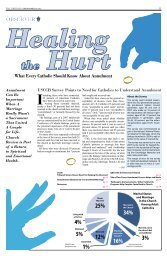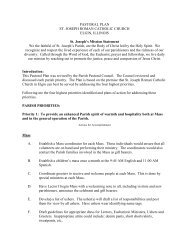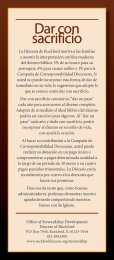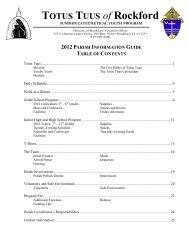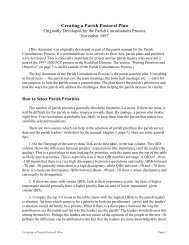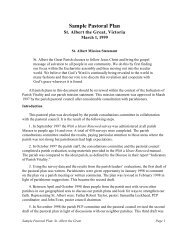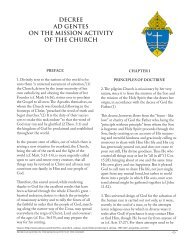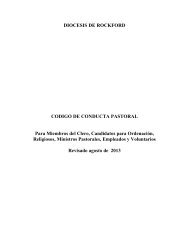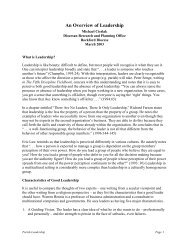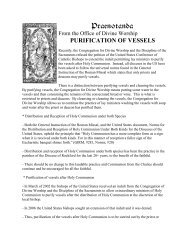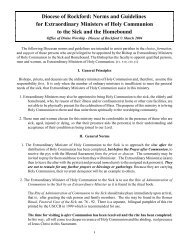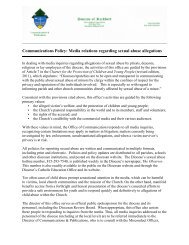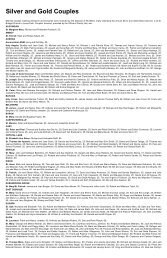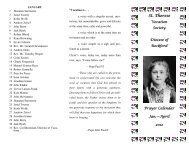Extraordinary Ministers of Holy Communion at Mass - Diocese of ...
Extraordinary Ministers of Holy Communion at Mass - Diocese of ...
Extraordinary Ministers of Holy Communion at Mass - Diocese of ...
You also want an ePaper? Increase the reach of your titles
YUMPU automatically turns print PDFs into web optimized ePapers that Google loves.
13. The preferred method <strong>of</strong> giving <strong>Communion</strong> under both kinds is to give the Eucharistic bread first and the<br />
Eucharistic wine. If <strong>Communion</strong> is given by intinction, the communicant may never dip the Eucharistic<br />
bread into the chalice. <strong>Communion</strong> under either the form <strong>of</strong> bread or wine must always be given by a<br />
minister with the usual words. In all th<strong>at</strong> pertains to <strong>Communion</strong> under both kinds, the Norms for the<br />
Distribution and Reception <strong>of</strong> <strong>Holy</strong> <strong>Communion</strong> under Both Kinds in the <strong>Diocese</strong>s <strong>of</strong> the United St<strong>at</strong>es <strong>of</strong><br />
America are to be followed (see nos. 27-54, Norms).<br />
14. The faithful are not permitted to take up the Eucharistic bread or the sacred chalice themselves, and still less,<br />
hand them on to one another. The norm for reception <strong>of</strong> <strong>Holy</strong> <strong>Communion</strong> in the dioceses <strong>of</strong> the United<br />
St<strong>at</strong>es is standing. Communicants should not be denied <strong>Holy</strong> <strong>Communion</strong> because they kneel. R<strong>at</strong>her,<br />
the Pastor should address such instances pastorally by providing the faithful with proper c<strong>at</strong>echesis on<br />
the reasons for this norm.<br />
15. When receiving <strong>Holy</strong> <strong>Communion</strong> in the hand, the communicant bows his or her head before the sacrament as<br />
a gesture <strong>of</strong> reverence and receives the Body <strong>of</strong> the Lord from the minister. The consecr<strong>at</strong>ed host may be<br />
received either on the tongue or in the hand <strong>at</strong> the discretion <strong>of</strong> each communicant. When <strong>Holy</strong> <strong>Communion</strong><br />
is received under both kinds, the sign <strong>of</strong> reverence [bow <strong>of</strong> the head] is also made before receiving the<br />
Precious Blood.<br />
16. The blessing <strong>of</strong> children or infants should not be encouraged while distributing <strong>Communion</strong>. Children and<br />
infants are blessed with the full assembly <strong>at</strong> the end <strong>of</strong> <strong>Mass</strong>.<br />
17. If the Eucharistic bread or some particle <strong>of</strong> it falls, it should be picked up reverently by the minister. The<br />
consecr<strong>at</strong>ed bread may be consumed or completely dissolved in w<strong>at</strong>er before being poured down the<br />
sacrarium.<br />
18. Should there be any mishap--as when, for example, the consecr<strong>at</strong>ed wine is spilled from the chalice--then the<br />
affected “area . . . should be washed and the w<strong>at</strong>er poured into the sacrarium [GIRM, 280].”<br />
19. In those instances when there remains more consecr<strong>at</strong>ed wine than was necessary, if needs dict<strong>at</strong>e,<br />
<strong>Extraordinary</strong> <strong>Ministers</strong> <strong>of</strong> <strong>Holy</strong> <strong>Communion</strong> may consume wh<strong>at</strong> remains <strong>of</strong> the Precious Blood from their<br />
cup <strong>of</strong> distribution with due reverence <strong>at</strong> the altar. Sufficient instruction is to be given by the Pastor. When<br />
a sufficient number <strong>of</strong> priests or deacons is not available, <strong>Extraordinary</strong> <strong>Ministers</strong> <strong>of</strong> <strong>Holy</strong> <strong>Communion</strong> may<br />
purify the vessels. The amount <strong>of</strong> wine to be consecr<strong>at</strong>ed should be carefully measured before the<br />
celebr<strong>at</strong>ion so th<strong>at</strong> none remains afterward. It is strictly forbidden to pour the Precious Blood into the ground<br />
or into the sacrarium. (Norms, 51-55).<br />
20. Similarly, “consecr<strong>at</strong>ed hosts are to be reserved in a ciborium or vessel in sufficient quantity for the needs <strong>of</strong><br />
the faithful; they are to be frequently renewed and the old hosts properly consumed” (Code <strong>of</strong> Canon Law, no.<br />
939). Burying hosts or consecr<strong>at</strong>ed Eucharistic bread is strictly forbidden.<br />
IV. Concluding Rite<br />
21. <strong>Extraordinary</strong> <strong>Ministers</strong> <strong>of</strong> <strong>Holy</strong> <strong>Communion</strong> do not particip<strong>at</strong>e in the procession <strong>at</strong> the conclusion <strong>of</strong> the <strong>Mass</strong>.<br />
After they have exercised their ministry within <strong>Mass</strong>, they should return to their places in the assembly.<br />
3



